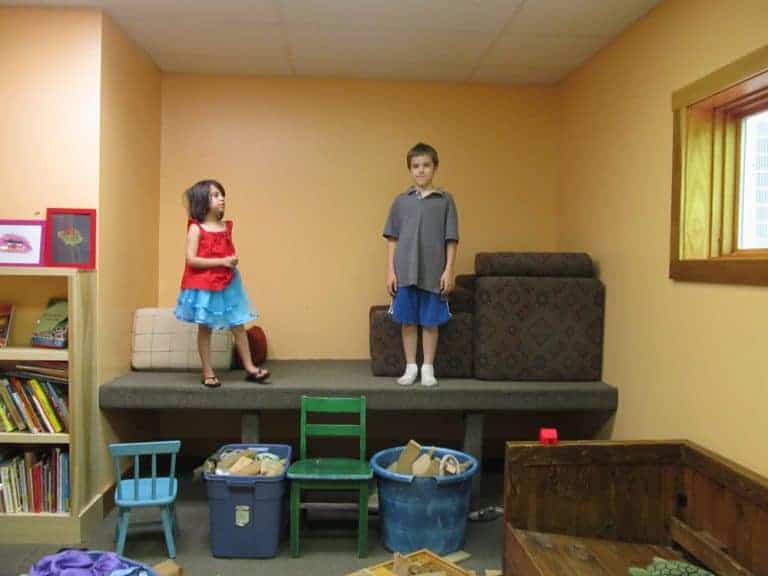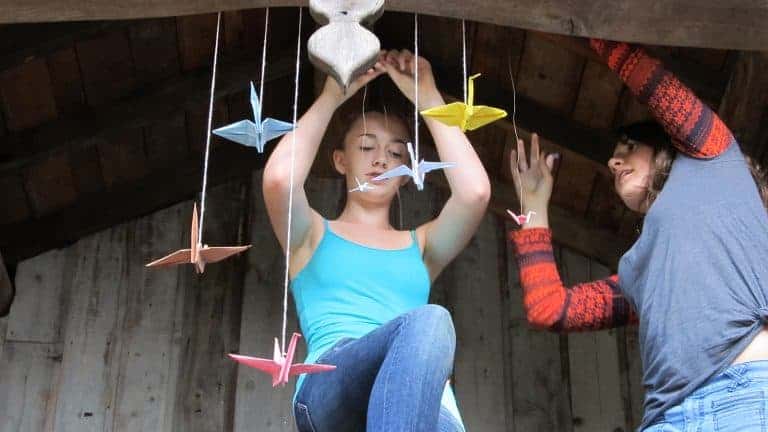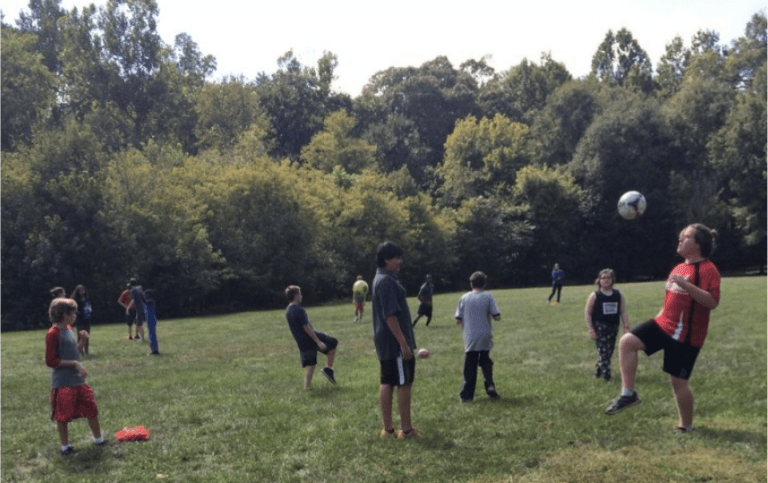Guest Post: Play Will Save Your Life
(Reprinted here with permission, a blog post from Frome School founder Guy Wilson. http://fromefreeschool.co.uk/
Best wishes to Guy and his start-up group as they open a Sudbury school in the United Kingdom!)
After seven hours of traffic jams and motorways, my family and I are bored rigid. Our aging golden Labrador snores sonorously in the back of the VW Fastback. Muffet is virtually blind and suffers from arthritis… this may be the last of her annual trips to the Berwickshire seaside.
At last we arrive. We get out of the car at the much-loved gate that heralds the entrance to our beloved summertime retreat.
At that moment, something miraculous occurs.
Muffet leaps out. She wags her tail vigorously and runs to the cliff-edge, drawing in the brisk sea breeze, re-charging her batteries. She bounds around like a puppy, greeting old friends with licks and yelps of excitement. She darts about from person to door to garden to gate in a mad display of excitement. The rest of us are soon copying, getting caught up in the act, whooping and laughing with the fun of it all.
The tension of the drive has gone, we all feel exuberant and the rest of the day has a freedom and ease that we haven’t felt since we were last there.
This scene illustrates what a surge of recent research is telling us about the power of play. Most obviously, play is fun; it enlivens us; it relieves tension; it makes us happy; it seems to open us up to new possibilities.
Consider, however, that this is just the tip of the iceberg. Neuroscientists, developmental biologists, psychologists and social scientists now know that play is in fact a profound biological process. It actually makes us smart and lies at the very core of creativity. It is fundamental to all profound learning. Stuart Brown, author of Play (2009) says that play actually “shapes the brain”. He explains that the more playful an animal is, the bigger its brain (compared to body size). New brain-imagining techniques show that brain activity is at its greatest when mammals are engaged in play activities. Neural and cognitive connections get created, even when we’re a bit long in the tooth. The brain is literally being built and re-designed as we play.
Witness how play is now used in large corporations to foster creativity and team-work. When I worked in the City, the whole atmosphere in the office was one of play. High fives and laughing, flirting and boozing. Playfulness kept us all going, lightened the atmosphere and gave us the kind of working environment we needed to cope with vast workloads and huge amounts of stress.
Brown goes as far as to say that “play is the basis of all art, music, books, sports, films, fashion and fun –that it is in fact the basis of culture”. Now kiddos, there’s a good excuse for not doing your homework. “But I just wanna play, Mummy. Stuart Brown says….”
In his blog “Freedom to Learn”, Peter Gray adds that “Play in our species serves many valuable purposes. It is a means by which children develop their physical, intellectual, emotional, linguistic, social, and moral capacities. It is a means of creating and preserving friendships. It also provides a state of mind that, in adults as well as children, is uniquely suited for high-level reasoning, insightful problem solving, and all sorts of creative endeavors.” Now hang on a minute there, Peter, surely that’s one for Mr Gove. Our Education Secretary needs to know that human beings are intrinsically ludic. Double play on a Monday morning from now on, everybody.
Brown also tells us that “The opposite of play is not work. It’s depression.” If Barack Obama understood this, would he still be saying that kids need to “spend more daytime hours in school, with longer school days, school weeks and school years” (quoted from Danny Weill in Counterpunch magazine)? No. When humans are brought up without play, they become incurious, materialistic, angry, self-centred and boring.
True, economists argue, workers tend to be more manageable after 14 years of doing what they’re told, thereby contributing better to the country’s economy. But what’s the flip side? Just listen to Todd Kashdan, author of a recent book entitled Curious: “We know that novel, engaging, curious activities reverse the cognitive decline of old age,” he says. “We can extrapolate that extensive levels of boredom could have the opposite effect… Science shows you can die of boredom, literally.” Yes folks, it’s official. Playlessness kills.
This week I have been seeking advice from state-funded Sudbury Schools in Denmark, Germany and Israel (yes, good news for Frome Free School: there are already enlightened governments out there who fund democratic free education), as well as the oldest and most famous democratic school of all, Summerhill, which has been running for 86 years. In these radical schools, children literally play all day, in mixed age groups. Contrary to popular assumptions, their educational results are very persuasive. All of Summerhill’s students this year went on to further or higher education, for example. And get this from Dan Greenberg, co-founder of Sudbury Valley School: “Every single Sudbury Valley student who has ever wanted to has gone on to college education.” SVS has been going for 42 years.
Greenberg continues: “The last thing any parent wants today is a child who will be good at following strict orders that somebody else lays down. That is the kiss of death. That is a guarantee of a poor economic future. The best future anyone can ask for is a child who’s inventive, who is a self-starter, who is imaginative, who can overcome failure … not afraid to try things out.” Anyone who has worked in the modern world knows Greenberg is right. Industrial-type jobs have mercifully now been taken by robots. We no longer need to be taught to do as we’re told. The implications for schools and parents alike are huge.
So what is play, exactly? Well, it seems to be different for different people. Play can involve anything from running around, rough and tumble, exploring, building, role-play, make believe, formal games, or just reading a book. You’ll be able to add to my list, I’m sure, because to me, the secret weapon that play represents is essentially ontological. By this I mean that play is more a way of being than a definable set of actions. Children brought up being happy are likely to continue being happy through adulthood, because ‘happy’ is who they have become. The more time children spend at play, the more their essential qualities as human beings become those associated with play. Energised, alert, creative, focused, smart, empathic, joyful, “in the zone”, skilful, empowered, imaginative, stimulated, physically fit, free, healthy, curious, constructive, cooperative, egalitarian, autonomous, social. These are the qualities we want for our children. We could live our whole lives at play, in fact, and be incredibly successful. Lots of rich people do just that.
I’d like to leave you with a quote from a Zen Buddhist master: “A person who is a master in the art of living makes little distinction between their work and their play, their labour and their leisure, their mind and their body, their education and their recreation, their love and their religion. They hardly know which is which and simply pursue their vision of excellence and grace, whatever they do, leaving others to decide whether they are working or playing. To them they are always doing both.”
“Play has to be THE core activity of any post-industrial educational institution”, writes Greenberg. This is why, at Frome Free School, we want mixed aged play to be at the heart of our curriculum.
Over the next few weeks, I intend to explore how play contributes to other areas of development, such as morality, reasoning, responsibility, equality and sustainability. If you have any questions about how these theories are going to apply to Frome Free School in reality, please do feel free to post.


